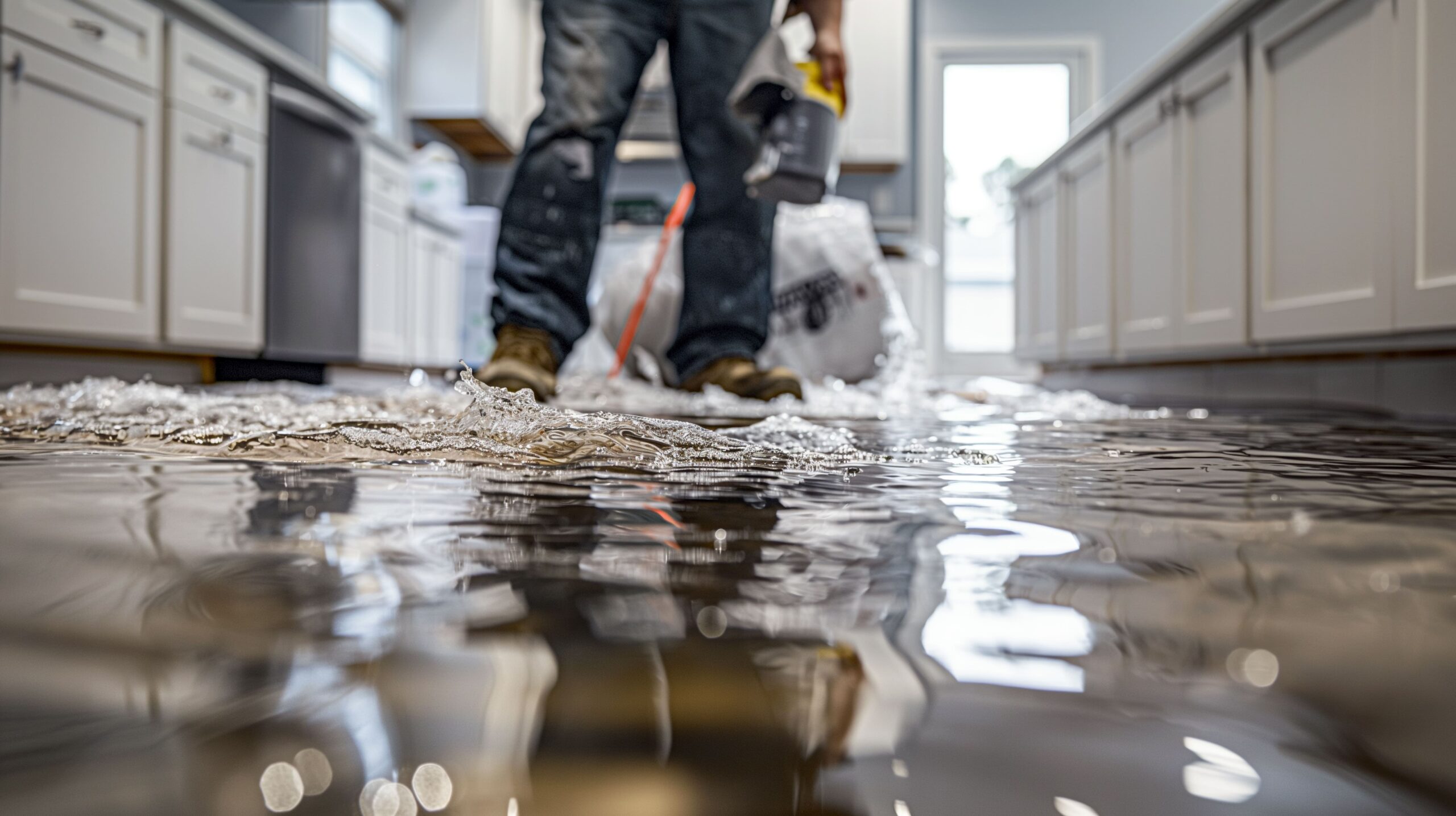The Total Guide to Browsing the Difficulties of Water Damage Restoration
Water damage can strike unexpectedly, leaving you with a daunting mess to tidy up. Understanding the causes and evaluating the extent of the damage is crucial. Your prompt actions can make a substantial difference in the outcome. But what steps should you take first, and how can you guarantee you're safeguarded relocating ahead? The responses depend on a thorough strategy to reconstruction that every home owner need to know.

Comprehending the Root Causes Of Water Damage
Water damage can strike all of a sudden, typically leaving you scrambling to resolve the consequences. Recognizing the root causes of water damages is important for prevention. Flood Damage Restoration. Common perpetrators consist of dripping roof coverings, burst pipelines, or malfunctioning appliances. You could also come across issues with your plumbing systems, like stopped up drains or sewage backups, which can result in considerable water breach. Weather-related cases, such as hefty rainfalls or flooding, can also damage your residential or commercial property. On top of that, the age of your home plays a function; older frameworks usually have degrading materials that are extra at risk to leaks and damages. Even small concerns, like condensation from a/c systems, can collect and cause problems gradually. By identifying these possible resources of water damages, you can take proactive actions to secure your home and reduce future threats. Staying informed will empower you to recognize early indicators and act promptly when issues emerge
Examining the Level of the Damages
Assessing the extent of the damages is crucial for determining the suitable feedback when you've recognized a prospective water damages issue. Begin by checking the affected locations extensively. Try to find noticeable indications like water stains, deformed floorings, or peeling off paint. Don't neglect to inspect surprise spots, such as behind walls or under rugs, where wetness could linger.Next, figured out the kind of water entailed-- clean, gray, or black-- considering that this influences the intensity of the damages and required removal actions. Utilize a moisture meter to determine humidity degrees in floors and wall surfaces, helping you recognize sticking around moisture that can cause mold and mildew growth.Document everything with photos and notes, as this information can be essential for insurance policy cases. By properly assessing the damages, you'll be better geared up to determine on the best restoration strategy and avoid further concerns down the line.
Immediate Tips to Take After Water Damage
After experiencing water damages, the first point you need to do is assess the circumstance thoroughly. Prioritizing your safety and security is essential, so make certain the location is secure prior to taking any additional actions. Don't fail to remember to document everything completely, as this will be very important for insurance coverage cases and restoration initiatives.
Examine the Damage
Evaluating the damage promptly is important for decreasing the impact of water intrusion. Start by checking the impacted locations to figure out the level of the water damage - Water Damage Cleanup. Try to find visible signs like soaked carpetings, deformed floors, and stained walls. Check for hidden water, also, especially in crawl areas and behind devices. Use a dampness meter if you have one, as it can help pinpoint locations that require focus. Paper every little thing with pictures and notes; this will serve for insurance cases. Keep in mind to evaluate your items too-- furnishings and individual products may need expert cleansing or disposal. By understanding the level of the damage, you can make informed decisions concerning the next steps in the remediation process
Prioritize Safety First
Understanding the extent of water damages is just the beginning; your safety and security comes. Prior to you enter a water-damaged area, ensure to switch off the electricity and gas supply to avoid any type of risks. Put on protective equipment, consisting of boots and handwear covers, to shield on your own from pollutants. Beware of architectural instability-- ceilings, floorings, or wall surfaces may have damaged. Stay clear of call and telephone call professionals for help if the water is coming from a sewage resource. Keep pets and kids away from the damaged location. Leave instantly if you smell gas or see electrical stimulates. Keep in mind, prioritizing your safety warranties you can successfully deal with the damage without risk to your health. Always err on the side of caution.
Record Everything Completely
As you begin attending to water damages, recording whatever extensively is important for both insurance coverage cases and repair initiatives. Begin by taking clear pictures of the impacted areas, catching the degree of the damage. Make certain to keep in mind the date and time of the occurrence. Create a listing of damaged things, including furnishings, appliances, and personal valuables, together with their estimated values. Videotape any activities you take, like speaking to experts or relocating things to protect against further damages. Maintain all billings and receipts associated with the remediation process. This paperwork will enhance your situation when suing and aid the remediation group understand the circumstance better. Keep in mind, detailed paperwork can make a substantial distinction in your recovery trip

Minimizing More Concerns and Stopping Mold Development
When water damage takes place, acting quickly can greatly lower the danger of more problems, specifically mold development. Remove any standing water making use of pumps or damp vacuums. Next off, completely dry out the impacted areas thoroughly. Open up windows, utilize followers, and consider dehumidifiers to quicken the drying out procedure. Go for a moisture degree below 60% to inhibit mold spores from settling.Inspect all surface areas and materials influenced by water; throw out anything that can't be properly dried out, like drenched carpets or drywall. Clean and sanitize staying surfaces with a mix of water and cleaning agent, or a specialized mold-preventive solution.Keep an eye on the area over the following few weeks. Address it promptly if you observe any musty scents or discoloration. Bear in mind, prompt action not just protects against mold and mildew development however also safeguards your building and wellness.
Functioning With Water Damages Restoration Professionals
After taking instant steps to mitigate water damages and prevent mold and mildew growth, it's time to ponder expert help. Water damage reconstruction specialists have the knowledge and equipment required to manage considerable damage effectively. When you get to out, prepare to define the situation carefully. This assists them analyze the seriousness of the damages and prepare accordingly.Once they show up, expect a comprehensive evaluation and a comprehensive prepare for repair. They'll use specialized devices to remove water, dry impacted areas, and sterilize your room. Don't wait to ask inquiries throughout the procedure; understanding their methods can alleviate your concerns.You needs to additionally discuss timelines and what to expect at each phase of the remediation. Working together openly with these specialists guarantees you remain informed and entailed, assisting you regain your area much more successfully. Count on their proficiency, and you'll see your home go back to its pre-damage condition.
Navigating Insurance Cases for Water Damage
Navigating insurance claims for water damage can really feel frustrating, specifically if you're not familiar with the procedure. Review your insurance coverage plan to understand what's covered. Search for specifics on water damage, as not all policies treat it the exact same. Document the damage extensively-- take photos and make notes about what took place and when.Next, call your insurance policy supplier without delay. Report the damages and provide them with your documentation. They'll assign an insurance adjuster to assess the circumstance. Be prepared to answer concerns and give extra details as needed.Stay organized throughout the process. Keep a record of all communications, consisting of days, names, and information of conversations. If your claim is rejected or you feel it's inadequate, don't wait to appeal. Know that perseverance can pay off, so advocate for yourself to assure you obtain the insurance coverage you're entitled to.
Tips for Future Water Damage Avoidance
To keep your home secure from water damages, routine maintenance checks are crucial. Don't neglect the value of mounting water detection systems, as they can alert you to leakages prior to they become significant concerns. By remaining proactive, you can save yourself time, cash, and stress and anxiety down the road.
Routine Upkeep Checks
While it may seem laborious, carrying out normal maintenance checks can considerably reduce the risk of future water damage in your house. Beginning by examining your roofing for missing out on leakages or tiles; even small issues can intensify rapidly. Inspect downspouts and gutters to ensure they're clear and guiding water away from your structure. Look for indications of wetness in cellars or crawl spaces, and deal with any leakages from appliances or pipes quickly. Keep in mind to check your sump pump frequently to verify it's functioning correctly. Don't fail to remember about your cleaning device tubes; replace them every few years to avoid burst disasters. By remaining aggressive with these checks, you'll conserve yourself time, cash, and tension over time.
Install Water Discovery Solutions

Regularly Asked Inquiries
The length of time Does the Water Damage Reconstruction Process Typically Take?
The water damages restoration process generally takes anywhere from a few days to numerous weeks, depending on the level of the damages. You'll want to act promptly to lessen further problems and expedite the procedure.
Can I Remain In My Home During the Remediation Refine?
You can remain in your home during the restoration procedure, however it relies on the level of the damages. If it's serious, it's more secure to briefly transfer until the work's completed and your home's safe.
What Personal Products Can Be Salvaged After Water Damages?
After water damage, you can commonly salvage products like garments, books, and electronic devices, offered they're not saturated or musty. Always analyze their problem quickly and seek advice from specialists for advice on remediation and safety.
Are There Any Do It Yourself Methods for Bring Back Water-Damaged Things?
Yes, you can use DIY techniques to bring back water-damaged items. For furniture, air-dry and apply a wood conditioner. For textiles, wash them extensively and air-dry. Always examine for mold and mildew before attempting any type of remediation.
How Can I Identify Hidden Water Damage in My Home?
To determine covert water damage, look for water discolorations on walls and ceilings, listen for dripping sounds, feel for moisture in products, and check out areas near pipes for signs of mold or mildew development. When you've determined a potential water damages concern, examining the degree of the damage is vital for establishing the appropriate action. As you start addressing water damages, get more info documenting whatever extensively is important for both insurance coverage claims and repair initiatives. Water damages reconstruction professionals have the experience and equipment needed to manage considerable damages properly. Installing water detection systems can be a game-changer for protecting against future water damage in your home. The water damages restoration process commonly takes anywhere from a few days to numerous weeks, depending on the degree of the damages.
Comments on “Flood Damage Restoration FAQs: Your Most Common Questions Answered”